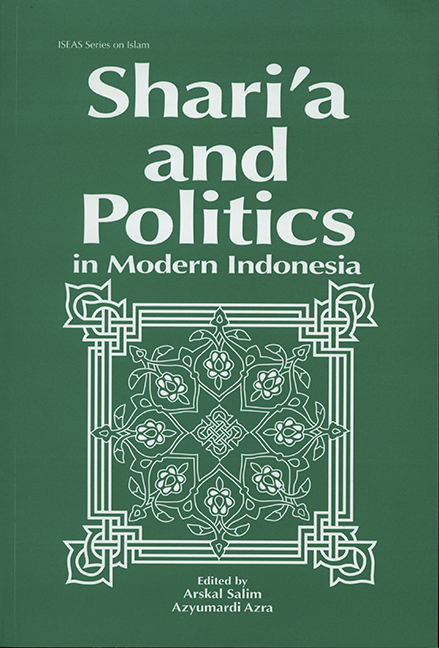Book contents
- Frontmatter
- Contents
- Acknowledgments
- List of Contributors
- Glossary
- 1 INTRODUCTION: The State and Shari'a in the Perspective of Indonesian Legal Politics
- 2 LAW AND POLITICS IN POST-INDEPENDENCE INDONESIA:A Case Study of Religious and Adat Courts
- 3 THE STATE AND SHARI'A IN INDONESIA
- 4 THE STATE'S LEGAL POLICY AND THE DEVELOPMENT OF ISLAMIC LAW IN INDONESIA'S NEW ORDER
- 5 THE INDONESIAN MARRIAGE LAW OF 1974: An Institutionalization of the Shari'a for Social Changes
- 6 INDONESIA'S 1989 RELIGIOUS JUDICATURE ACT: Islamization of Indonesia or Indonesianization of Islam?
- 7 THE POLITICAL BACKDROP OF THE ENACTMENT OF THE COMPILATION OF ISLAMIC LAWS IN INDONESIA
- 8 ISLAMIZING CAPITALISM: On the Founding of Indonesia's First Islamic Bank
- 9 FATWA AND POLITICS IN INDONESIA
- 10 ZAKAT ADMINISTRATION IN POLITICS OF INDONESIAN NEW ORDER
- 11 ISLAMIC VALUES, LAW AND EXPECTATIONS IN CONTEMPORARY INDONESIA
- 12 EPILOGUE: Shari'a in Indonesia's Current Transition: An Update
- APPENDICES
- Bibliography
- Index
2 - LAW AND POLITICS IN POST-INDEPENDENCE INDONESIA:A Case Study of Religious and Adat Courts
Published online by Cambridge University Press: 21 October 2015
- Frontmatter
- Contents
- Acknowledgments
- List of Contributors
- Glossary
- 1 INTRODUCTION: The State and Shari'a in the Perspective of Indonesian Legal Politics
- 2 LAW AND POLITICS IN POST-INDEPENDENCE INDONESIA:A Case Study of Religious and Adat Courts
- 3 THE STATE AND SHARI'A IN INDONESIA
- 4 THE STATE'S LEGAL POLICY AND THE DEVELOPMENT OF ISLAMIC LAW IN INDONESIA'S NEW ORDER
- 5 THE INDONESIAN MARRIAGE LAW OF 1974: An Institutionalization of the Shari'a for Social Changes
- 6 INDONESIA'S 1989 RELIGIOUS JUDICATURE ACT: Islamization of Indonesia or Indonesianization of Islam?
- 7 THE POLITICAL BACKDROP OF THE ENACTMENT OF THE COMPILATION OF ISLAMIC LAWS IN INDONESIA
- 8 ISLAMIZING CAPITALISM: On the Founding of Indonesia's First Islamic Bank
- 9 FATWA AND POLITICS IN INDONESIA
- 10 ZAKAT ADMINISTRATION IN POLITICS OF INDONESIAN NEW ORDER
- 11 ISLAMIC VALUES, LAW AND EXPECTATIONS IN CONTEMPORARY INDONESIA
- 12 EPILOGUE: Shari'a in Indonesia's Current Transition: An Update
- APPENDICES
- Bibliography
- Index
Summary
Introduction
The shift from colonial to sovereign status did not bring any direct or pervasive changes to bear on the stature of law in the young Republic of Indonesia. By the time the proclamation of independence was issued on August 17, 1945, law in Indonesia had essentially changed little since the Japanese occupation of Java. As most of the nation's elite was, in the early days of independence, people who had dominated Indonesian politics during the colonial era, the revolutionary ideas of grass-roots movements had not yet penetrated common legal parlance. This elite did not constitute a radical, social element interested in the reformulation of the former colonial state apparatus. On the contrary, they were quite content to fall back on the familiar. Strategies for social revolution, or even social change were hardly mentioned formally within the legal sector at this time. Symptomatic of this situation was the Transitional Provision in Article 2 of the 1945 Constitution which stipulates that “All existing institutions and regulations of the state shall continue to function so long as new ones have not been set up in conformity with this Constitution.” Hence, to avoid creating a legal vacuum, the new government was forced to reintroduce many laws inherited from the colonial era. An example of this is the Wetboek van Strafrecht measures, enacted in 1915, which continued to regulate criminal law in Indonesia, except in those regions outside of Java where native courts remained operative. In the latter, only a few articles of laws inherited from the Dutch were applied through the provisions of Law No. 80 of 1932.
This paper will address the development of Indonesian law in the post-independence era. In the following pages, I aim to demonstrate that changes in the country's political climate affected both the Islamic and adat (customary) courts, in spite of the inflexibility with which both legal traditions had weathered the political upheavals of the first half of the century. To this end, the place of both adat and religious courts in post-independence Indonesia will be analyzed in light of this political change.
- Type
- Chapter
- Information
- Shari'a and Politics in Modern Indonesia , pp. 17 - 32Publisher: ISEAS–Yusof Ishak InstitutePrint publication year: 2003

